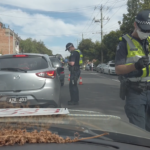May Day Car Convoy Rally Calls for Worker Rights and Climate Action: An Interview With Rachel Evans
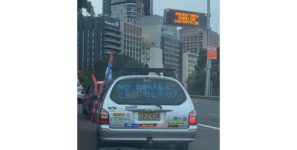
The May 1 Movement held the No Worker Left Behind car cavalcade protest in Sydney’s CBD on 9 April. It was drawing attention to the federal government having just passed the JobKeeper wage subsidy package, which simply neglected to cover 2.2 million workers.
However, a week after the car convoy rolled past NSW parliament, Australian attorney general Christian Porter imposed a new regulation that means employers only have to give 24 hours’ notice when making changes to conditions contained within enterprise bargaining agreements.
So, as financial support has not been extended to short-term casual workers, gig employees and temporary visa holders, and the Morrison government is simply further eroding workers’ rights, the May 1 Movement is once again holding a Sydney car convoy protest this Friday.
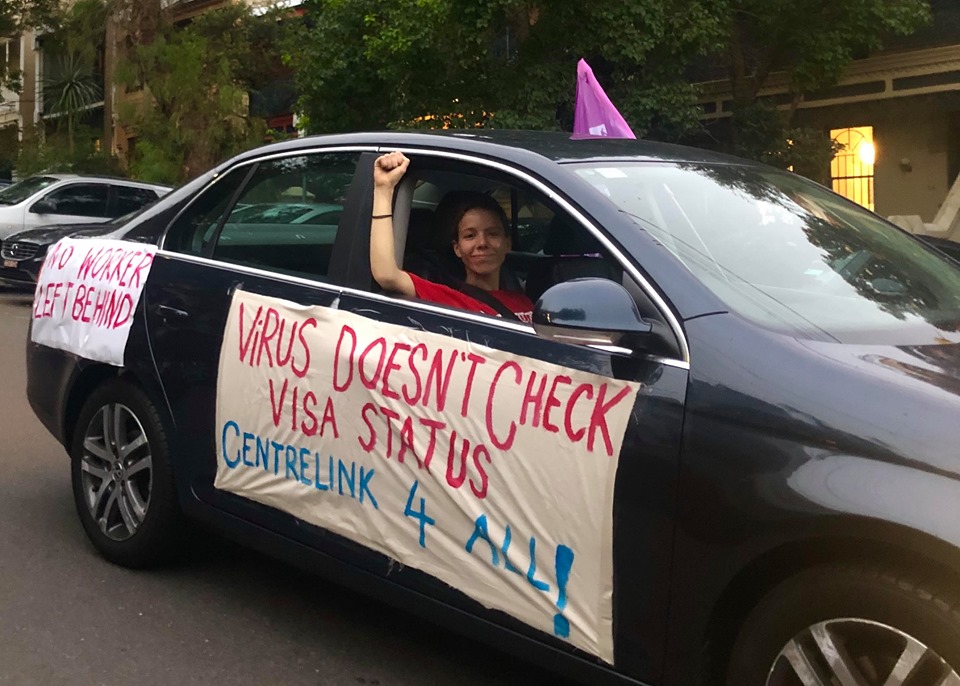
A just transition
And this time round, Water for Rivers is heading a May Day environment contingent as part of the car convoy protest, which is set to begin winding its way through Sydney’s CBD – passing particular corporate targets – at 11 am on Friday 1 May.
The environment contingent will be underscoring that the climate emergency the planet was facing prior to COVID-19 hasn’t taken a rest during the pandemic, and nor has the need for a just transition for all workers continuing to be employed within the fossil fuel sector.
Sydney Criminal Lawyers spoke to Waters for Rivers spokesperson Rachel Evans about the environment contingent’s focus, the reason why it’s important to be able to keep on demonstrating during the pandemic, and the need to ensure that water continues to flow down the rivers.

Firstly, this Friday, the May 1 Movement, in conjunction with the MUA and the CFMMEU, are running the May Day No Worker Left Behind Car Convoy. This is the third such socially distant motorised protest of its type over recent weeks.
What’s the rally in aid of, Rachel? And why can’t it wait for an easing of COVID-19 restrictions?
The rally is taking up a range of issues. It’s taking up workers’ rights issues. It’s taking up climate justice issues. It’s taking up the issue of putting health before profits. And it’s also raising international solidarity issues.
We’re calling for this rally to happen on May Day, because it’s a historic day for workers’ protest. Last year, a range of unions protested on 1 May, and we’re following in that tradition.
In this time when COVID restrictions are really important to abide by for us to eradicate the killer virus, we are consciously moving in separate cars as individuals or with a maximum of two people per car, as the health regulations stipulate.
But, we’re also saying that this is an essential service, because we’re protesting the government.
It is giving billions of dollars away in subsidies to big business and has introduced anti-worker laws in the form of being able to change an enterprise bargaining agreement with one day’s notice.
This has all been done in the last two weeks. We don’t want to forgo this important day for the protest movement. So, we’re protesting on 1 May.
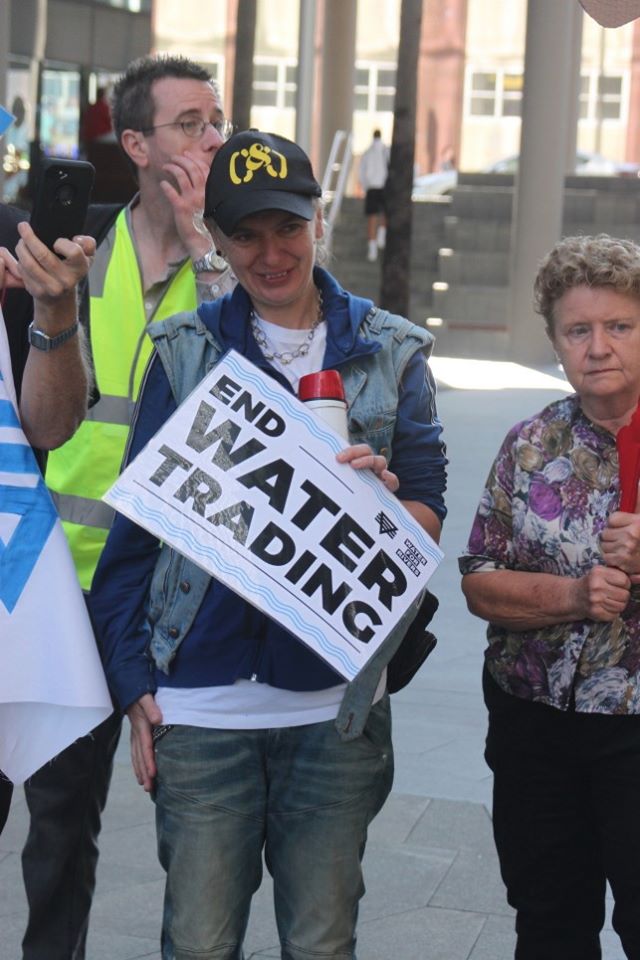
You’re representing environmental group Water for Rivers at the event. And you’re calling on other such green-minded groups to join the cavalcade.
Why would you say environment groups should be joining the May Day rally? And what will the environment contingent be focusing on?
It’s really important during this pandemic not to forget the climate crisis that we are in.
There have been a lot of evolutionary biologists, climate scientists and environmentalists that have made the link between the climate catastrophe, carbon in the atmosphere, international travel, the ravaging of native forests, particularly in the Global South, and the rise of the dense urban populations bringing animals and humans together, as all being a cause of these pandemics: SARS, MERS and COVID-19.
So, in this time of the COVID-19 crisis, we can’t forget that the environmental crisis knows no bounds and it’s exacerbating the tension between animals and humans, and exacerbating this health crisis that we’re in.
We’re calling for environmental groups to come out and demand climate justice, demand public works programs to decarbonise the economy, and a just transition for all fossil fuel workers.
We’re also demanding climate justice for Indigenous communities and all those on the frontline of the climate crisis.
This union-led car cavalcade is relating to what the environment movement has been calling on for a long time, which is green jobs now and a green and just transition.
We’re gathering together various environment groups to come together with green hats and demand green jobs.
A similar May 1 Movement car convoy protest took place on 9 April without a hitch. This was despite concerns that NSW police might have prevented it due to the lockdown.
Since then, a Victorian car cavalcade protest was shut down in Melbourne. And this was done via the issuing of $43,000 worth of infringement notices.
Are there concerns about whether the NSW restrictions might affect this Friday’s event? And why is it important to continue to raise dissenting voices during the lockdown?
We’re really concerned about the restrictions on our right to protest. So, this is being done safely.
There have been two car convoys that have been done over the last month. They have been totally safe, and they haven’t been fined or restricted. They were led by the unions.
We’re very worried to hear that Unions NSW has been told that our convoy participants will be facing $1,000 fines for their involvement. That causes us great concern.
We have to push back against these antidemocratic measures introduced and threatened by the government, because our right to protest safely in this period is an important part of our democratic rights, so that we can show the government that we’re concerned and worried.
This rally is also taking up the issue of no evictions. And we’re very concerned to hear both in Victoria and NSW more and more stories of renters facing eviction.
A lot of people are going to be experiencing significant economic hardship in this coming period.
There will be up to 20 percent unemployment, and we’re uncertain as to how long JobSeeker will last. And there are 2.2 million people who aren’t eligible for JobSeeker or JobKeeper.
This is of grave concern, and we need to be able to protest these measures.
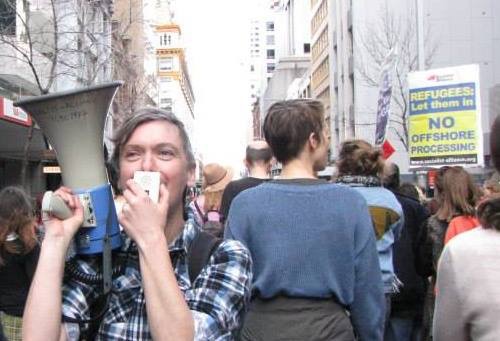
As discussed, Water for Rivers is organising the May Day protest environment contingent. Water for Rivers formed in 2018 to draw attention to the major maladministration that led to the drying up of the Murray-Darling water system.
Rachel, what’s going on with this state’s waterways at present?
Water for Rivers aims to bring together the cities and rural and regional areas to campaign against water trading and to have water for rivers and community, not for profit.
There has been a lot of rain in the last four or five months, thankfully. So, the rivers in the Murray-Darling region are full. But, not all of them.
Lake Menindee has received some water flow into its gorgeous lakes. But, the corporate pumps are still pumping.
Embargoes against corporate pumps at the end of 2019 were lifted to allow agribusiness – that’s cotton farms and almond farms – to get their fill at the expense of communities.
So, we are remaining ever vigilant. There was an action on 13 March, where Wilcannia residents led the campaign to end water trading by sitting down for six hours at Wilcannia Bridge, and other sites in NSW followed suit in solidarity and protest.
We will still be protesting at the end of this period outside the water ministry, demanding an end to water trading and corporate pumping during low to medium flows.
The communities in the northwest are celebrating on the one hand, but also, remain vigilant.
And lastly, looking at Friday’s May Day car cavalcade, what’s most important that protesters express on the day? And what are the ultimate gains you want to see?
The key demand is no worker left behind. But, there will be various contingents. Refugee rights activists will be showing up. And some housing activists will also be showing up and taking action to demand an amnesty on rents.
Of course, then there’s the environment contingent. The Knitting Nannas have indicated their support. Activists within Extinction Rebellion have also offered support.
We’re hoping that a variety of grassroots environment groups will join hands with militant unions to say we’ve had enough.
We want to transition this economy away from the profiteering corporate sector and towards the environment and the community.


